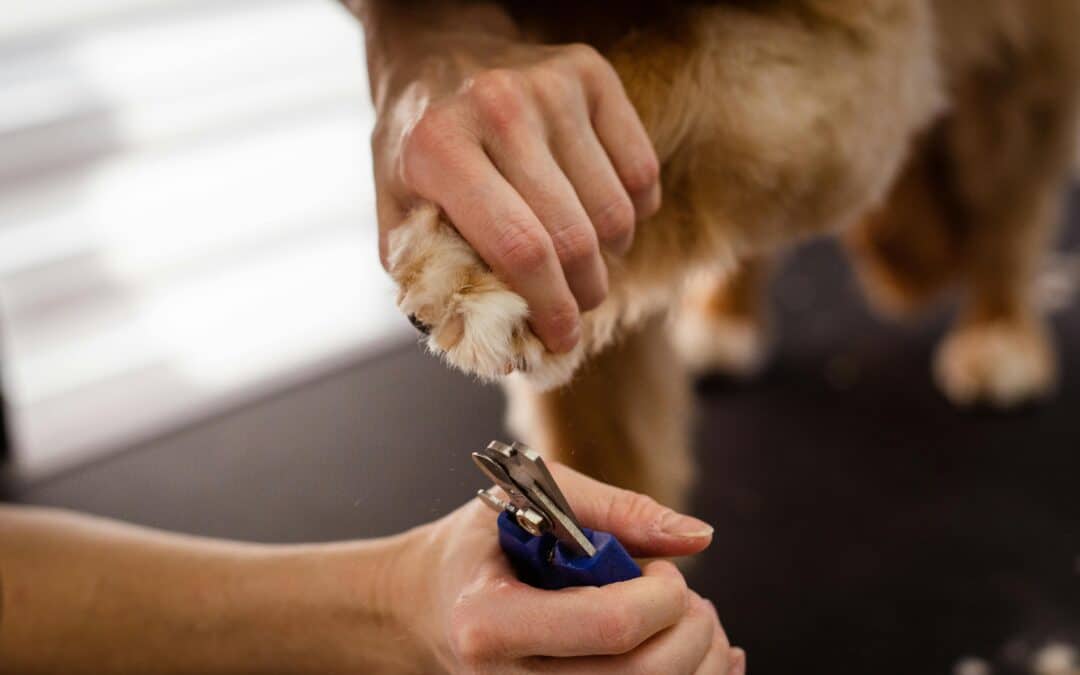Dog Bit The Groomer | What Do I Do? | Sally Said So
Disclaimer: This article is intended solely for informational and educational purposes and does not constitute legal advice or professional guidance. It provides general training techniques aimed at helping prevent future incidents. We strongly recommend consulting a qualified professional before attempting any training with a dog that exhibits aggressive behavior during grooming. Please be aware that the information provided is not comprehensive and should be applied at your own discretion and risk.
Grooming appointments can be stressful for both dogs and their owners—especially if your dog has bitten a groomer. The good news is that with proper training and preparation, many of these situations can be avoided. At Sally Said So, we specialize in helping dog owners in Charlotte train their pets to feel comfortable and cooperative during grooming. In this article, we’ll explore how proactive training, desensitization, and selecting the right groomer can set you and your dog up for grooming success.
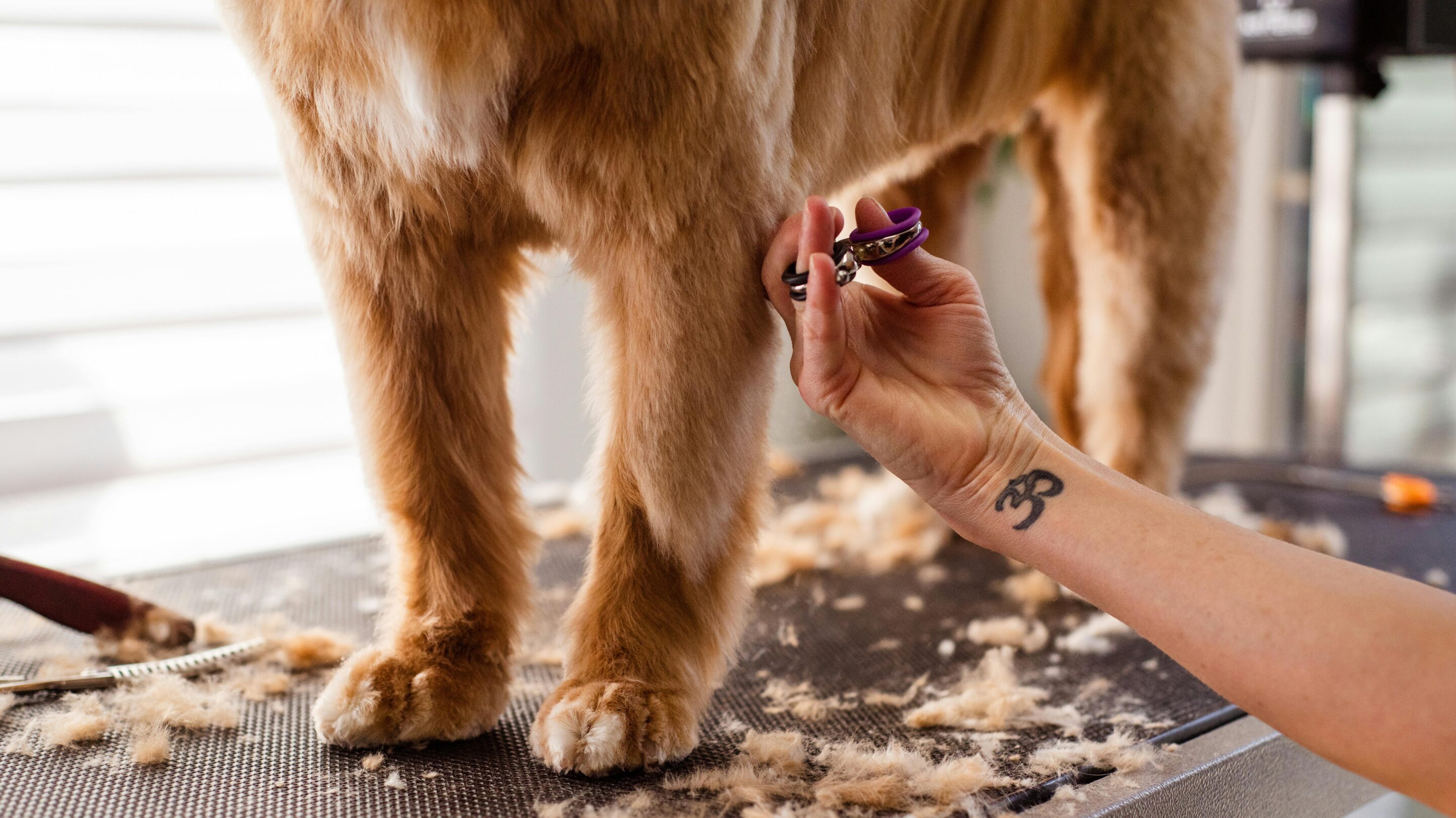
Aggression and Grooming: Why Does It Happen?
Dogs may display aggressive behavior at the groomer for a variety of reasons, often linked to fear or discomfort. Some common triggers include:
- Insufficient handling or training: A dog that hasn’t been physically handled or trained for grooming procedures can be skeptical and made easily nervous by the experience.
- Past negative experiences: A negative grooming experience may make your dog wary or fearful of being handled. This can lead to an overly defensive dog.
- Loud noises and equipment: Clippers, dryers, and other grooming tools can be frightening for noise-sensitive dogs.
- Physical restraint: Being restrained, even gently, can cause stress for dogs who are not used to it.
Recognizing early signs of distress—such as lip-licking, “whale eyes,” or avoidance behaviors—can help you address the problem before it escalates into biting. Aggression is often a dog’s last resort to escape a situation they find overwhelming. In many cases, the dog feels that its warnings have been ignored and it must resort to biting to protect itself and end the encounter.
At Sally Said So, we work with Charlotte pet owners to identify the causes of grooming-related aggression and intolerance and develop a personalized training plan to reduce anxiety and improve your dog’s tolerance for grooming.
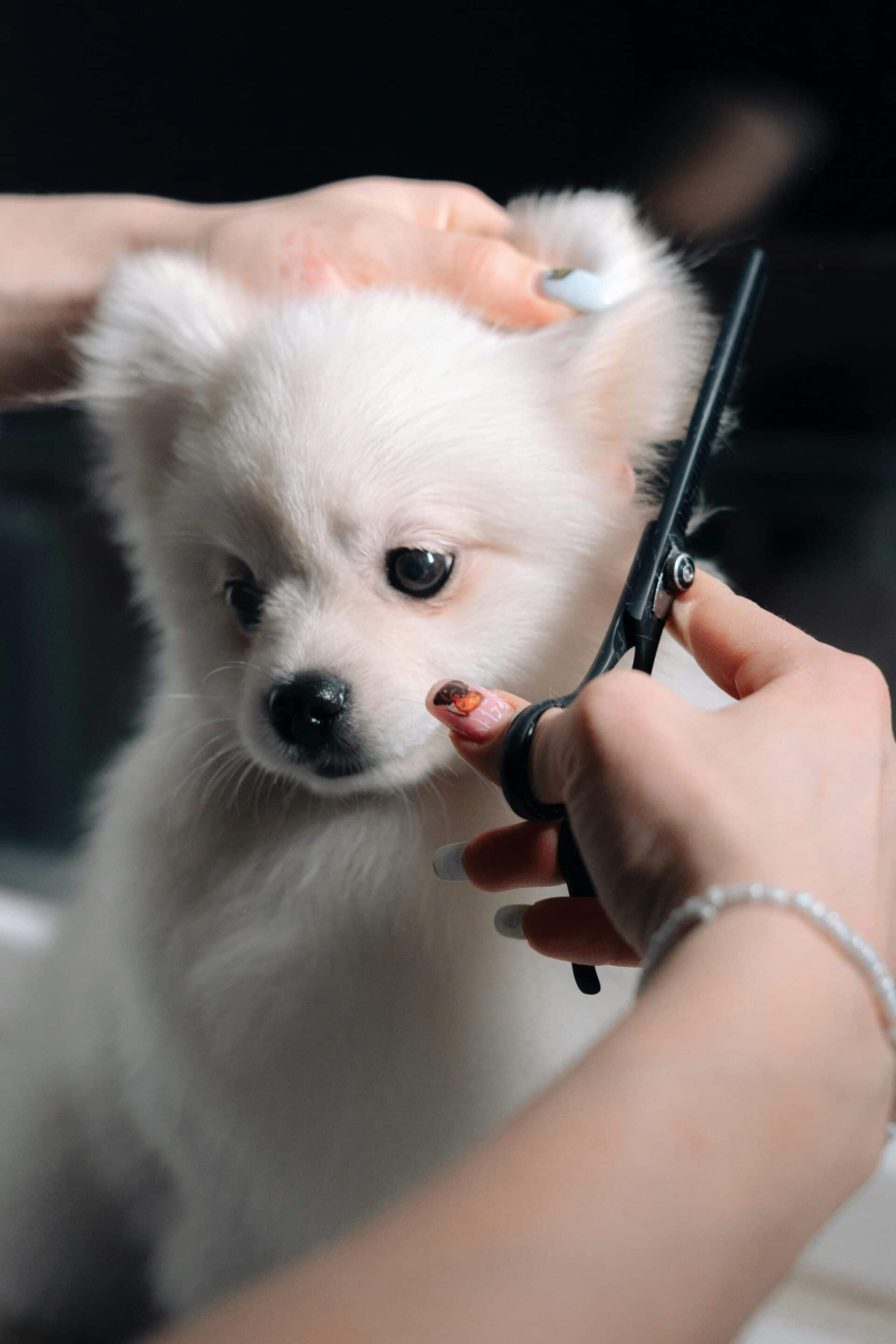
How to Prepare Your Dog for Grooming Appointments
Preparation is key to ensuring a smooth grooming experience. You can help your dog get ready by gradually introducing them to grooming actions at home. Here’s how:
-
Touch desensitization: Start by gently handling your dog’s paws, ears, and muzzle. Make this a positive experience by giving treats and praise as you touch each part of their body. Gradually increase the time and intensity of handling as your dog becomes more comfortable. If your dog is adverse to touch, consult one of our professionals first.
-
Introduce grooming tools early: Get your dog used to the sight and sound of grooming tools. Play the sound of clippers or blow dryers at a low volume while giving them treats to help them associate the sound with positive experiences. Even just keeping the nail clippers out and in sight can help reduce your dog’s anxiety of the tool.
-
Practice short sessions: Keep initial practice sessions short—just a few minutes at a time—so your dog doesn’t become overwhelmed. Over time, your dog will learn that grooming doesn’t need to be a stressful event.
At Sally Said So in Charlotte, we offer private training sessions to help your dog build up their tolerance to handling and grooming actions.
What Skills Does My Dog Need for the Next Grooming Appointment?
Teaching your dog a few essential skills can make grooming appointments far less stressful. The following behaviors can help your dog cooperate during their appointment:
- Staying calmly for brushing: Practice having your dog sit or lie down while being gently brushed. Reward them for staying calm and still.
- Tolerating touch on sensitive areas: Dogs need to get used to having their paws, ears, and mouth handled. Regularly touch these areas in short sessions, rewarding your dog with treats for staying calm. Please, consult one of our professionals first if your dog is adverse to touch.
- Noise tolerance: Help your dog get used to loud grooming tools by playing the sounds of clippers or dryers while they’re in a relaxed state. Start with low volumes and gradually increase the noise.
If your dog struggles with any of these skills, training sessions with a professional can be helpful. Sally Said So’s trainers in Charlotte can work one-on-one with your dog to develop these necessary behaviors.
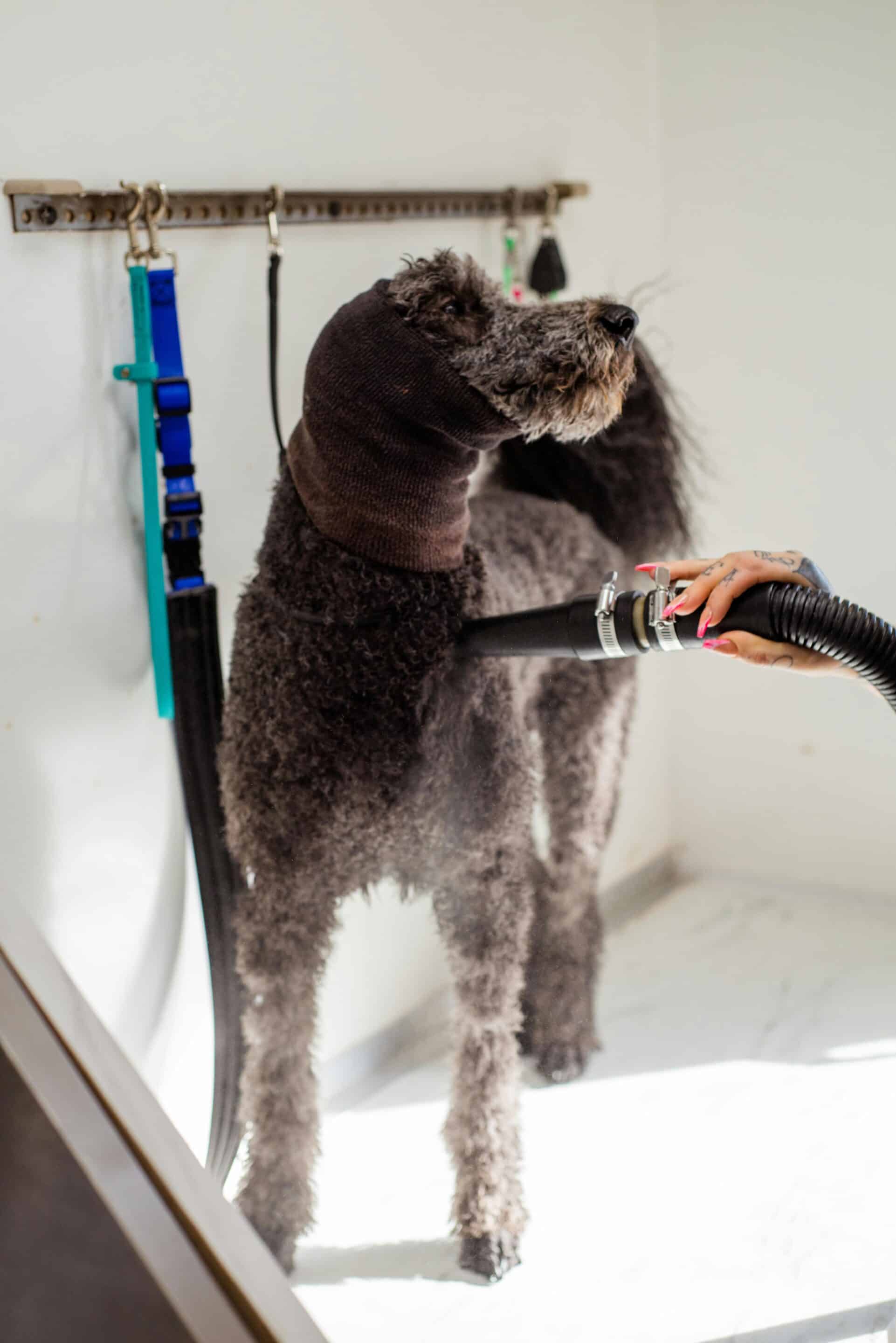
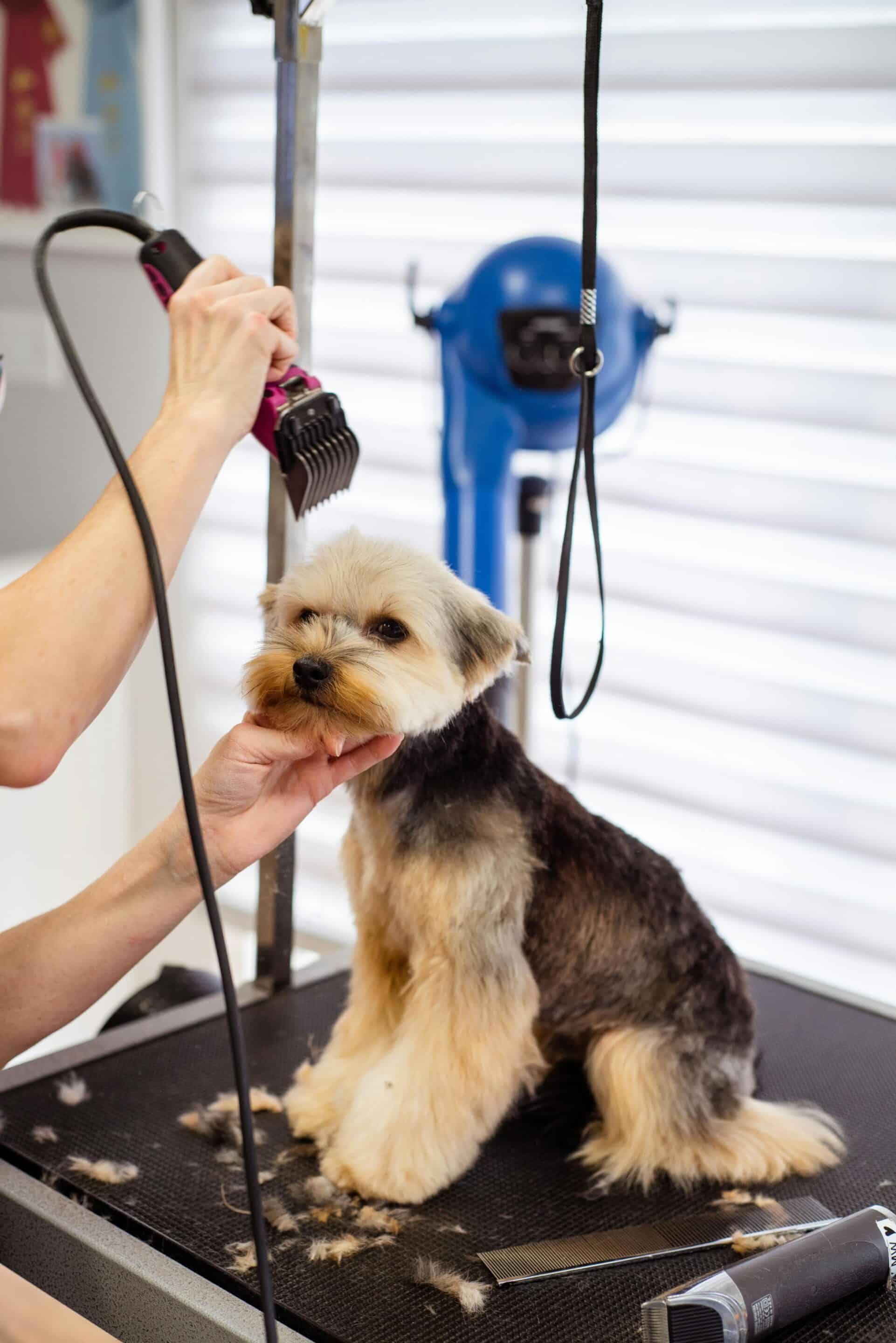
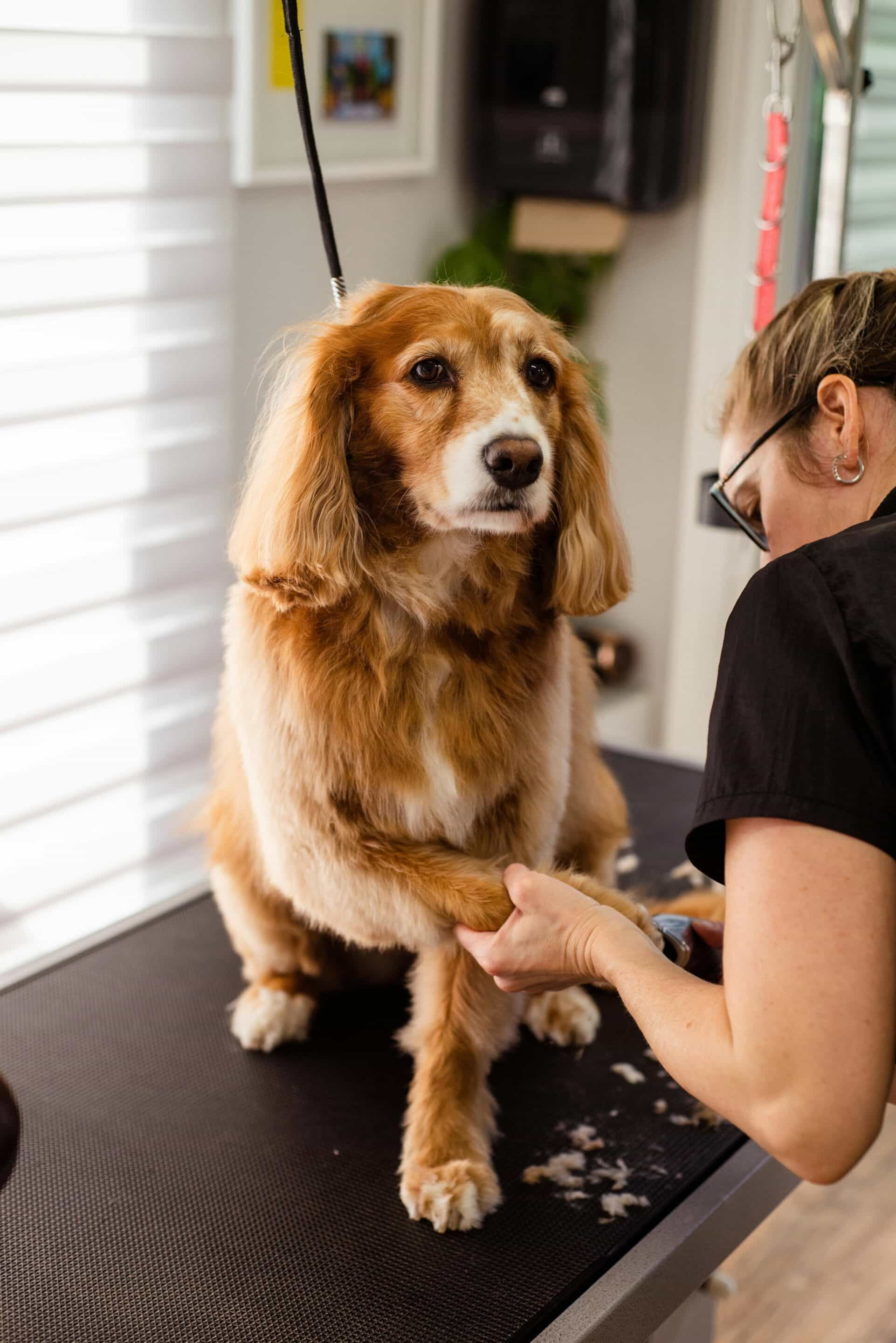
How Can I Select a Dog Groomer?
Choosing the right groomer is crucial, especially if your dog has shown signs of anxiety or aggression. Here’s how to find the best groomer for your dog’s needs:
- Ask about experience with reactive dogs: Look for groomers who have experience working with anxious or difficult dogs. Ask specific questions, such as how they handle dogs who get nervous or scared during the grooming process. Our company works extensively with groomers, veterinarians, and other professionals. We’d be happy to recommend the right groomer for you and your dog.
- Visit the grooming facility: Before booking an appointment, visit the groomer’s facility. Make sure it’s clean, calm, and organized. A quiet, controlled environment can make a big difference for sensitive dogs.
- Inquire about techniques and tools: Does the groomer use force-free handling methods? Are they equipped to deal with dogs who need extra patience and care? Finding a groomer who uses low-stress handling techniques can make grooming a more positive experience for your dog.
For Charlotte-area dog owners, there are many skilled groomers who specialize in handling nervous dogs. Sally Said So can also offer recommendations based on your dog’s specific needs.
Prevent Another Bite: Proactive Training and Management
Training your dog before their grooming appointment can make all the difference in preventing stress and reactivity. Here’s how you can be proactive:
- Positive reinforcement: Use treats and praise to reward calm behavior during grooming-related actions, such as being touched, brushed, or handled. This helps your dog build positive associations with these experiences.
- Set a routine: Practice the behaviors your dog will need at the groomer, such as sitting still, regularly at home. The more familiar these actions become, the less anxious your dog will feel.
- Real-life practice: Take your dog to places where they can practice being calm in potentially stressful situations. For example, Sally Said So offers group training sessions in public areas around Charlotte, helping dogs learn to manage distractions while maintaining focus.
The more familiar your dog is with grooming actions, the more relaxed they will be when the time comes for an actual appointment.
Dog Bit The Groomer: To Muzzle or Not to Muzzle
For some dogs, a muzzle may be necessary to ensure the safety of both the groomer and the dog. While many owners feel apprehensive about using muzzles, they can actually be a helpful tool when introduced correctly.
- Muzzle training: Start by introducing the muzzle slowly. Let your dog sniff the muzzle, and reward them with treats for showing interest. Gradually work up to having them wear the muzzle for short periods, increasing the time as they become comfortable.
- Safety first: A muzzle is not a punishment. It’s a management tool that can prevent a reactive dog from biting if they become overwhelmed or scared during grooming.
- When to use a muzzle: Muzzles are especially helpful for dogs who have a history of biting during grooming or who are still learning how to manage their fear in stressful situations.
In our Charlotte-based training sessions, we can help dog owners introduce the muzzle in a positive and stress-free way.
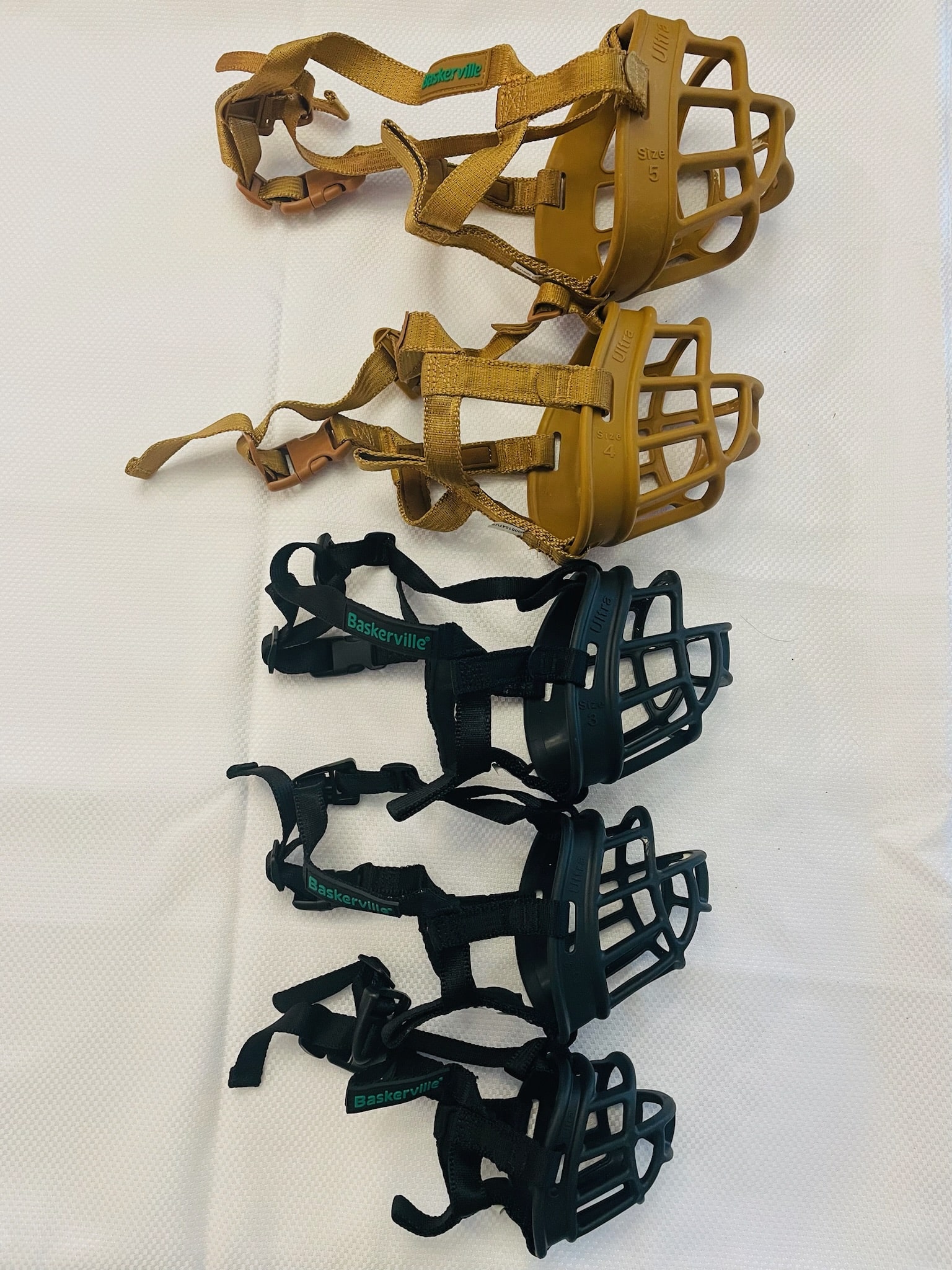
Mobile Groomers: A Stress-Free Option for Anxious Dogs
Mobile grooming services are becoming increasingly popular, especially for dogs that struggle with the traditional grooming environment. Having the groomer come to your home can significantly reduce your dog’s stress by keeping them in a familiar setting.
- Advantages of mobile grooming: Mobile groomers offer one-on-one attention, a quieter environment, and the ability to keep your dog in a familiar space.
- Local mobile grooming options: There are several mobile groomers in the Charlotte area who specialize in handling anxious or difficult dogs. Sally Said So can provide recommendations for groomers that cater to your dog’s specific needs.
Calming Techniques for Grooming Day
On grooming day, you can take several steps to help your dog feel more relaxed:
- Exercise beforehand: A brisk walk or play session can help release some of your dog’s pent-up energy and make them feel calmer before their appointment.
- Calming aids: Consider using natural calming aids like CBD treats or pheromone sprays (ALWAYS consult with your veterinarian first). These can help ease your dog’s nerves.
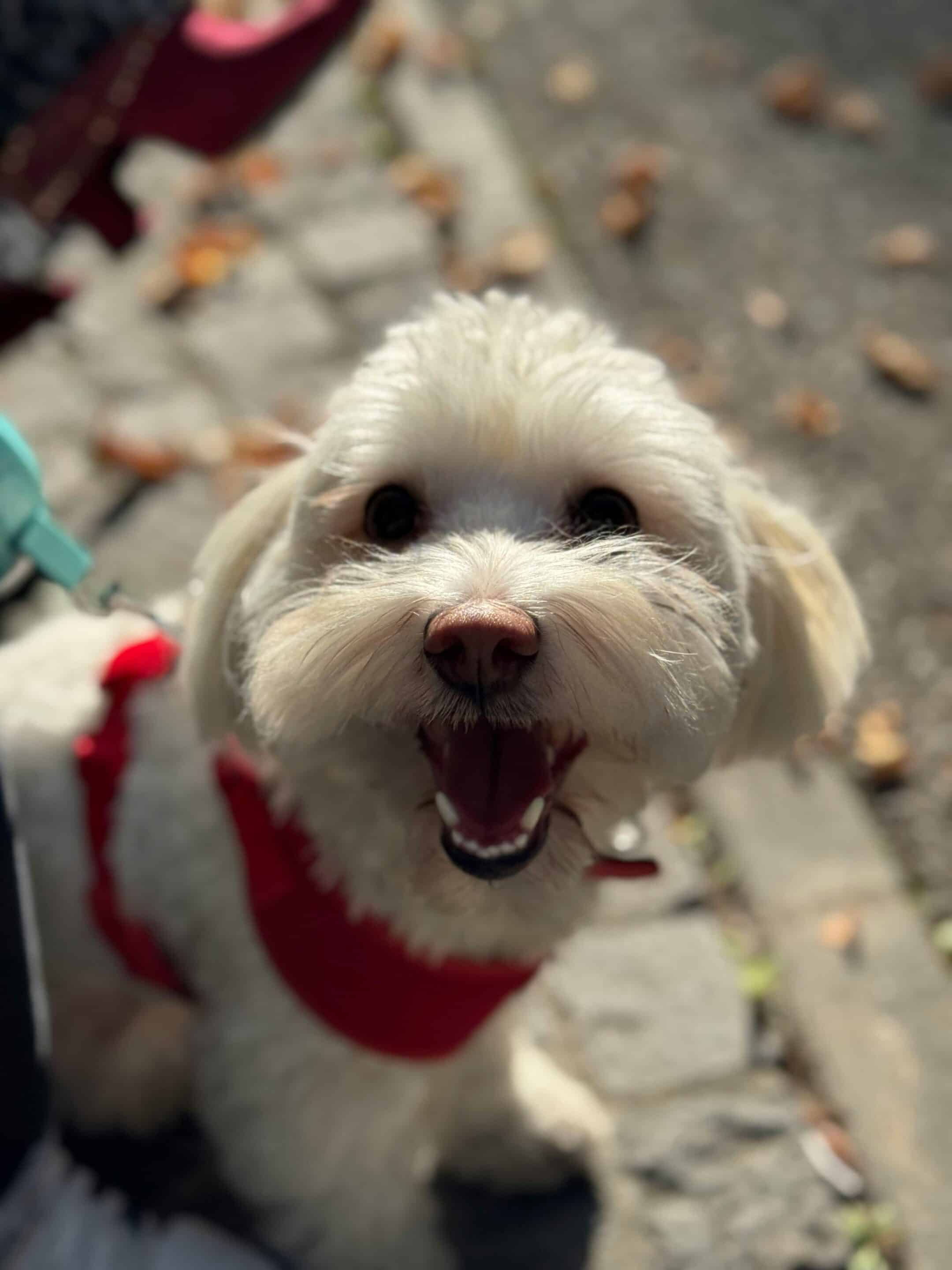
Invest in Proactive Training for Grooming Success
Grooming doesn’t have to be a stressful experience for your dog. By investing in proactive training and selecting the right groomer, you can help your dog feel more comfortable during grooming appointments and prevent incidents like biting from happening again. If you’re in Charlotte and need help preparing your dog for grooming, Sally Said So offers expert training to ensure your dog’s success.
Contact us today to schedule a consultation and learn how we can help your dog become comfortable and anxiety-free during grooming.
Contact Us
What Sets Sally Said So Apart?
We’ve been successfully helping dogs and owners resolve miscommunication and behavioral issues since 2009. We believe there are no bad dogs, just poor communication. We find that private dog training at the start of the process works since dogs and owners learn best in low-distraction environments. Once they have the training tools they need, we bring them into the real world. In our premier programs, we commit to your dog for their life which ensures you always have the support you need.
Sally Said So’s mission is to help more dogs by educating dog owners, supporting dog rescue, and empowering veterinary professionals across our state.

